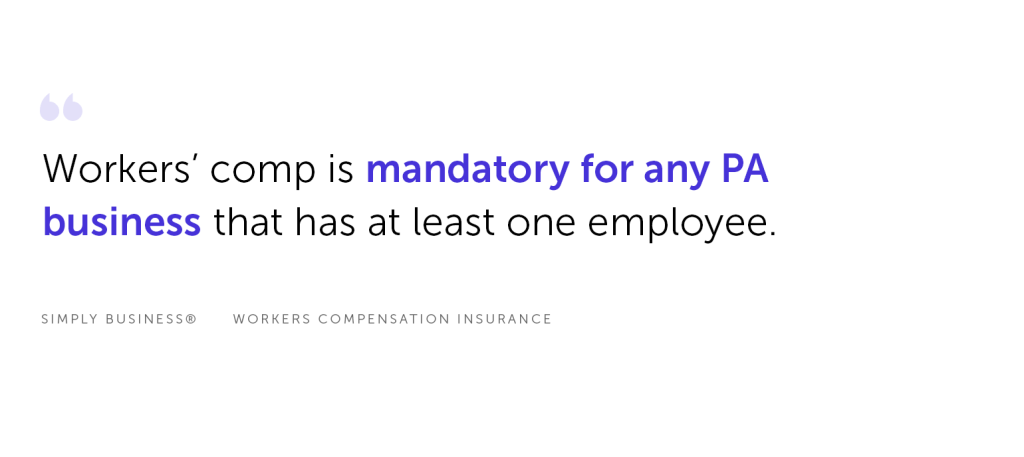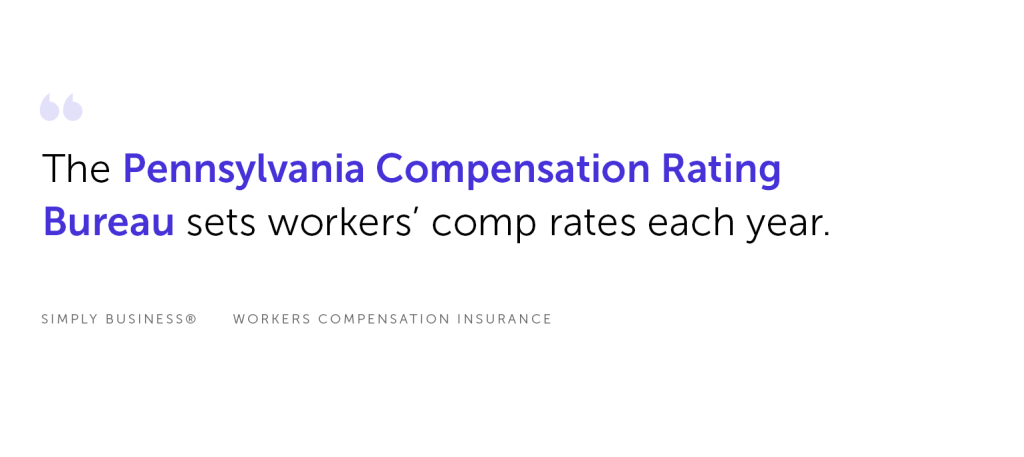Pennsylvania Workers’ Compensation Insurance
A guide to workers’ compensation insurance for small business owners in the Keystone state.
Simply Business is pleased to provide tailored insurance options from:
Pennsylvania is home to the world-famous, weather-forecasting groundhog, Punxsutawney Phil.
If you’re a small business owner who wants to know how much longer winter is going to last come February, you might be interested in what the little shadow-casting furball has to say.
However, if you’re looking for insight into workers’ compensation insurance requirements, Phil is probably the last critter you’d want to ask. According to Stormfax data, he’s been wrong far more times than he’s been right.
Nothing against Phil, but we may be able to provide more helpful information about Pennsylvania workers’ comp insurance.
So let’s get going.
Is Workers’ Compensation Insurance Required in Pennsylvania?
Yes. According to the Pennsylvania Department of Labor and Industry, workers’ compensation insurance is mandatory for any business that has at least one employee.
Of course, there are some exemptions, including:
- Railroad workers, longshoremen, and federal employees who are already covered under other workers’ compensation policies.
- Agricultural employees who work fewer than 30 days or earn less than $1,200 in a calendar year.
- Employees who are granted exemptions by the Department of Labor and Industry due to their executive status or religious beliefs.
However, for the most part, it doesn’t matter if you’re starting a new business or expanding your current one. Even if you have one employee, you’ll likely need workers’ compensation insurance. Even if that one employee is a family member who works for you only a handful of hours each week.
The requirement applies to corporations, partnerships, LLCs, and sole proprietors that have at least one employee and an exemption does not apply.

How Much Is Workers’ Comp Insurance in PA?
How much workers’ compensation insurance is going to cost depends on a few factors. The big one is what type of business you own and the risk factors associated with it. The higher the risk of injury your employees may face, the higher the workers’ comp rate you are likely to pay.
Another factor is your payroll. The sheer number of people you employ will factor into the premium you pay.
Your claims history will impact the rate, too. If you are starting a new business, this may not apply to you; however, if you’re expanding your business, it might.
The Pennsylvania Compensation Rating Bureau
Many states set workers’ compensation rates based on guidance from the National Council on Compensation Insurance (NCCI). However, Pennsylvania is not one of those states. They use their own rating system. The Pennsylvania Compensation Rating Bureau (PCRB) sets the rates, which are updated every year.
The rates are based on class codes, or job classifications. The PCRB looks at your industry, the scope of work the employees do in that industry — and the risks involved. It then uses this information to help determine an appropriate rate.
As you might expect, businesses with higher risks of injury, such as roofing and tree removal, can expect to pay a higher workers’ comp rate than a traditional fitness club owner or caterer. If you’re interested in finding your class code and the minimum and maximum rates associated with it, click here.
If your business has more than one classification, then the math used to determine how much workers’ compensation insurance will cost can get a little tricky. However, you can estimate your premium following the steps outlined here.

Ways to reduce workers’s comp costs.
No matter your rate, there are ways to reduce workers’ comp costs, including:
1. Developing a certified workplace safety program.
“Certified” is the key word here as your safety plan will need to be certified by the PCRB in order to qualify for a 5% discount.
2. Getting an employee back to work.
Creating a program that helps injured employees get back to work as soon as possible can reduce workers’ comp disability payments.
One way to do this is to allow your employee to work part-time or for lighter hours than usual — as soon as they are physically able. Another way might be to have them perform a different job with lighter tasks.
Getting an employee back to work can improve productivity and the overall operation of your business. It also can help with workers’ comp costs.
Medical expenses can have an impact on your experience modification rating (x-mod). The longer an employee receives workers comp benefits, the higher the cost of the claim. Your claims history, as mentioned earlier, impacts your rate. Keeping it as low as possible can make a big difference.
Plus, there are other fringe benefits with a program like this. For instance, it can show your employees that you care about them and their welfare. That act alone can help with worker retention.
3. Providing a list of designated medical providers.
Under certain conditions, if you post a list of six or more healthcare providers who meet certain requirements, and your injured employee fails to be treated by a medical provider on that list, you may be “relieved of liability to pay for medical services rendered during the first 90 days of treatment.”
4. Striving for an injury-free workplace.
Preventing an injury before it happens is always a good idea and encouraged by Pennsylvania’s Workers’ Compensation Act which allows for a 5% premium discount if the employer has not had a compensable employee lost-time injury during the most recent two-year period. Check out the article we wrote on employee safety. In it, we offer helpful ways to avoid the biggest safety-related risks.
We also wrote an article on 10 of the Most Common Workers’ Compensation Claims. A quick read and you’ll probably understand why it’s so important to have workers’ compensation insurance.
5. Reporting suspected workers’ comp fraud.
Preventing insurance fraud can help you reduce expenses, which in turn can help lower the total cost of your workers’ compensation policy.

Penalty for Not Having Workers’ Compensation Insurance in PA
Failure to carry workers’ comp insurance when it is required by law is considered a criminal offense in Pennsylvania. Penalties may include:
- $2,500 fine for each day without coverage
- A year in prison for each day the employer does not have coverage
- Even larger fines ($15,000/day) and more prison time (7 years) for felony convictions, which generally means the employer intentionally violated the law
And it’s not just about following the law for fear of penalty. Having a workers’ compensation policy can:
- Protect your business’s finances in the event a claim is filed
- Prevent your business from being wiped out by a catastrophic claim
- Pay for legal fees if you need to defend yourself against a lawsuit
- Build trust with your employees
- Give employees a sense of security that they’ll be taken care of, should the worst happen

We’re Here to Help with Your Workers’ Compensation Insurance in PA
By now, you probably realize the value of having workers’ compensation insurance in the Commonwealth of Pennsylvania and what’s at stake if you don’t.
However, the realization means nothing if you have more questions and don’t know who to turn to for help. That’s where we come in.
At Simply Business, we focus on small businesses and small business insurance. Not only that, but we also focus on making it quick and easy to get.
Want a fast quote for workers’ comp coverage for your business? Check out our online quote tool. Answer a few questions related to your business, and we’ll take care of it from there. It should take you less than 10 minutes.
Or if you want to talk to a helpful human (one of our licensed insurance agents) and get your business covered via the phone, you can call 855-930-2844, Monday-Friday, 8 a.m.-8 p.m. ET.
PA Workers’ Compensation Insurance Rates
As mentioned earlier, class code rates are set by the Pennsylvania Compensation Rating Bureau. You can find them here. Minimum and maximum rates are provided.

Knowledge Is the Best Policy
Running a successful business is more than just making customers happy. It’s about keeping your employees happy, too. And making sure they’re cared for in the unfortunate event of an injury that requires them to miss work.
It’s also about following the law and financially protecting your business as it grows.
Workers’ compensation insurance is one way to accomplish all those things.
For more information on workers’ comp, as well as insight, advice, and business tools, visit our small business online resource center, Simply U.
Workers’ Comp Information in Other States
Simply Business has state information for workers’ compensation insurance in California, Colorado, Florida, Georgia, Illinois, Maryland, Minnesota, New Jersey, New York, North Carolina, Pennsylvania, Texas, Wisconsin.